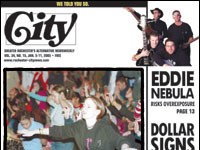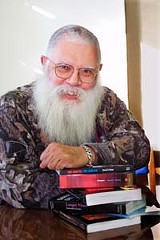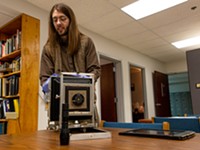[
{
"name": "500x250 Ad",
"insertPoint": "5",
"component": "15667920",
"parentWrapperClass": "",
"requiredCountToDisplay": "1"
}
]
Forty years ago, Samuel R. Delany changed the face of science fiction. He won the field's highest honors as a young man, and was seen as the most promising writer in a genre struggling to redefine itself.
His book, The Einstein Intersection, which won the Nebula Award in 1967, is both action adventure and exploration of myth. Its language is literary and its allusions are esoteric. Billy the Kid, Jean Harlow, the Beatles, Orpheus, and Elvis all float through the novel like gorgeous ghosts. And Delany's colleagues held up the novel as an example of the genre at its finest. Critic Paul Di Filippo puts it this way: "There was a consensus at the time that he was the best and brightest."
Since then, science fiction has splintered into dozens of subgenres. Overrun by high-tech killing machines, elves and dwarves, Wookies and Klingons, science fiction no longer has such a clear sense of what it is or what it does well. But Samuel Delany has remained a potent force within the field.
He is now an academic, teaching at Temple University in Philadelphia. His works are often published by university presses, not in throwaway 35-cent editions, as they were at the beginning of his career. University of Rochester professor Jeffrey Tucker says of him: "He's one of us."
But Delany began his career as a science fiction writer, and to this day is part of that world. Though his audience has changed, he still holds a place of honor among older science fiction readers.
When he speaks at the University of Rochester next week, he will likely continue to overturn expectations and confront clichés head-on.
For starters, he's black and he's gay. Tucker, who is responsible for bringing Delany to Rochester, sees his work as "a very important example of the significance of the intersection of race and sexuality." Tucker uses Delany's works in classes focused not just on the SF field, but the wide spectrum of black American experience. Racial identity, slavery, the AIDS crisis: all of these are explored in Delany's fiction.
Those who attend the reading will not go away feeling soothed or empowered. Sexually adventurous, unapologetically intellectual, Delany does not reassure or comfort his audience. He is a true innovator, having written the first Cyberpunk novel (Nova) well before the term was coined. The Mad Man, a novel that even his strongest advocates call "pornographic," takes readers to a place few of us want to go.
The Motion of Light in Water, his autobiography, challenges the standard expectations for such work. The subtitle, "Sex and Science Fiction Writing in the East Village, 1957-1965," certainly addresses topics seldom linked together. His critical essays are as daunting as any to come from a high-powered intellectual. And Dhalgren, which sold over a million copies, is a huge and sweeping in its concerns, likely influenced by the urban riots and political chaos of the '60s.
Paul Di Filippo says, "The culture has mutated since the '60s. He seemed to embody the zeitgeist then. He used to be at the core of SF readership. Now he's on the periphery."
Yes, academics do exist on the fringes of American culture. But Samuel R. Delany is one who breaks that mold. His work, though embraced by fewer readers than before, still is relevant. He may not be at the crest of any cultural or intellectual wave. Still, his work retains much of the power it had when he began writing over 40 years ago.
Samuel R. Delany will speak on Monday, March 1, in the Welles-Brown Room of the Rush Rhees Library, on the University of Rochester River Campus, at 8 p.m. Free. 275-4092
Speaking of Samuel R. Delany, science Fiction
-

Film Review: "The Martian"
Oct 6, 2015 -

Film Review: "I Origins"
Aug 4, 2014 -

"Edge of Tomorrow"
Jun 11, 2014 - More »
Latest in Culture
More by Th. Metzger
-

Power and passion
Jan 5, 2005 -
Tales of the mundane
Nov 3, 2004 -

The dead are ever with us
Jun 30, 2004 - More »



